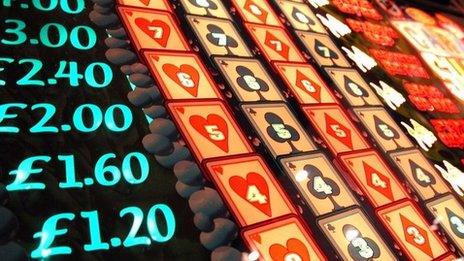Fixed-odds betting machines 'concerning', say ministers
- Published
- comments
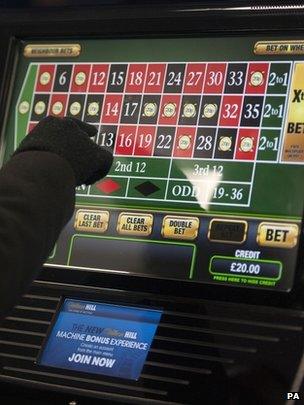
Bookmakers say few people play for high stakes
Ministers have said the growth of high-stakes roulette machines on the High Street is "concerning" and they do not rule out action to restrict them.
Culture Minister Helen Grant told MPs their future was "unresolved" and bookmakers must take immediate action to increase protection for players.
People can wager £100 every 20 seconds on fixed-odds betting terminals.
Labour said they were "an example of David Cameron's Britain" and councils should have new powers to curb them.
But following a Commons debate, Labour's call for local authorities to be given new powers to restrict the growth of the machines was defeated by 314 to 232 votes.
There are more than 33,000 fixed-odds betting terminals in the UK.
'Debt and misery'
The last Labour government relaxed the gambling laws, allowing bookmakers to start installing them.
But the party has accused the gambling industry of exploiting those changes to target poorer parts of the country,
It says fixed-odds betting terminals are acting as a magnet for crime and anti-social behaviour and local authorities should be given new powers to deal with "clusters" of shops opening together.
They would also review the number of high-speed, high-stakes fixed-odds betting terminals allowed on bookmakers' premises and would take steps to make the machines less addictive by requiring pop-ups and breaks in play.
Shadow culture minister Clive Efford said the last government had always maintained the machines should be kept under review.
The "world had changed" since they were first licensed, he said, with the online gambling industry now worth more than £2bn.
"These machines are an example of Cameron's Britain - one rule for constituents and another for big business which operate the betting shops," he said.
Another Labour MP, Brian Donohue, said fixed-odds betting terminals had been "likened to cocaine" as they were "absolutely and totally addictive".
Ministers insist that local authorities can already reject applications for new gambling premises and review existing licences.
But Ms Grant acknowledged the growth of the machines was "concerning" and she expected the industry to introduce voluntary player protection measures, such as suspensions in play and automatic alerts when stakes hit a certain level, by March.
She said the government was waiting for the findings of a study into "how [the machines] are used and the real impact on players" before deciding what further action may be needed.
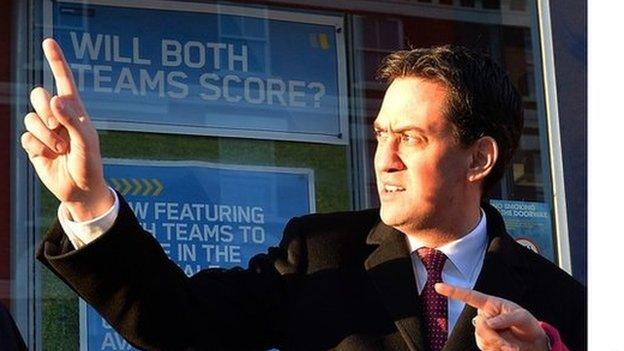
Ed Miliband says bookmakers are targeting disadvantaged communities
"There is no green light for these machines. Their future is unresolved pending the research we have started," she told MPs.
Labour, she added, had liberalised gambling laws and accused them of "rank hypocrisy, total cynicism and outright opportunism".
"Labour bought these machines into being and they have the audacity to bring forward a motion blaming the government for any harm caused," she said.
'Working class pursuit'
The gambling industry insists it does not target deprived areas and has introduced a code of conduct for player protection and responsible gaming.
"Betting is a pursuit enjoyed by millions of working class people throughout Britain and we seek to reach the widest audience possible by being present on High Streets," the Association of British Bookmakers said.
"We accept there are concerns about these gaming machines and are always open to a constructive dialogue with politicians about the appropriate powers for local authorities."
It added: "The claims of widespread problem gambling on machines is just not supported by evidence. The industry continues to develop its approach to harm mitigation for the small number of gamblers who do experience problems."
MPs have previously rejected calls from Labour to reduce the maximum stake from £100 to £2 and to cut the top prize from the current £500.
- Published20 December 2013
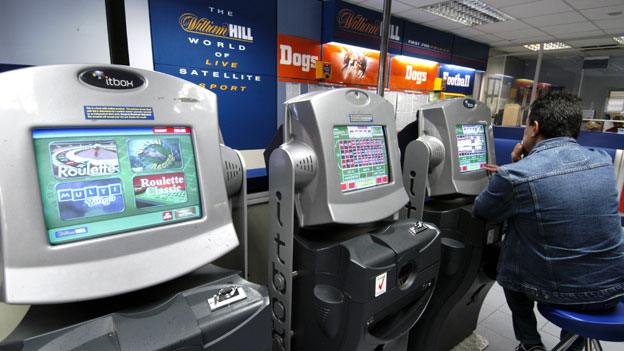
- Published4 December 2013

- Published18 June 2013
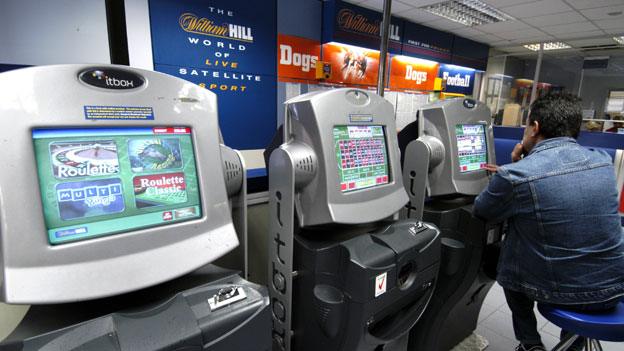
- Published23 October 2013

- Published7 November 2013

- Published17 September 2013

- Published23 August 2013

- Published13 December 2013
